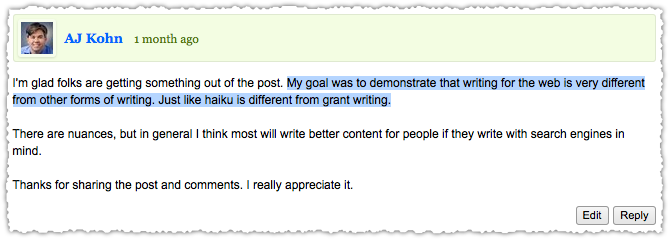Jeff Ente is the director of Who’s Blogging What, a weekly e-newsletter that tracks over 1,100 social media, web marketing and user experience blogs to keep readers informed about key developments in their field and highlight useful but hard to find posts. Mashable readers can subscribe for free here.
Algorithms aren’t going away anytime soon now that websites have a better way to directly describe their content to major search engines. Earlier this month, Google, Bing and Yahoo came together to announce support for Schema.org, a semantic markup protocol with its own vocabulary that could provide websites with valuable search exposure. Nothing will change overnight, but Schema.org is important enough to bring the three search giants together. Websites would be wise to study the basics and come up with a plan to give the engines what they want.
Schema.org attempts to close a loophole in the information transfer from website data to presentation as search results. As they note on their homepage: “Many sites are generated from structured data, which is often stored in databases. When this data is formatted into HTML, it becomes very difficult to recover the original structured data.â€
Simply put, Schema.org hopes to create a uniform method of putting the structure back into the HTML where the spiders can read it. The implications go beyond just knowing if a keyword like “bass†refers to a fish, a musical instrument or a brand of shoes. The real value is that websites can provide supporting data that will be valuable to the end user, and they can do so in a way that most search engines can read and pass along.
How Schema.org Works
Schema.org was born out of conflict between competing standards. Resource Description Framework (RDF) is the semantic standard accepted by The World Wide Web Consortium (W3C). The Facebook Open Graph is based on a variant of RDF which was one reason that RDF seemed poised to emerge as the dominant standard.
Until this month. Schema.org went with a competing standard called microdata which is part of HTML5.
Microdata, true to its name, embeds itself deeply into the HTML. Simplicity was a key attribute used by the search engines to explain their preference for microdata, but simplicity is a relative term. Here is a basic example of how microdata works:
<div itemscope itemtype="http://data-vocabulary.org/Person">
<span itemprop="name">Abraham Lincoln</span> was born on
<span itemprop="birthDate">Feb. 12, 1809</span>.
He became known as <span itemprop="nickname">Honest Abe</span> and later served as <span itemprop="jobTitle">President of the United States</span>.
Tragically, he was assassinated and died on <span itemprop="deathDate">April 15, 1865</span>.
</div>
A machine fluent in Microdata would rely on three main attributes to understand the content:
- Itemscope delineates the content that is being described.
- Itemtype classifies the type of “thing†being described, in this case a person.
- Itemprop provides details about the person, in this case birth date, nickname, job title and date of death.
Meanwhile, a person would only see:
“Abraham Lincoln was born on Feb. 12, 1809. He became known as Honest Abe and later served as President of the United States. Tragically, he was assassinated and died on April 15, 1865.â€
Fast forward to the web economy of 2011 and restaurants can use the same technology to specify item properties such as acceptsReservations, menu, openingHours, priceRange, address and telephone.
A user can compare menus from nearby inexpensive Japanese restaurants that accept reservations and are open late. Schema.org’s vocabulary already describes a large number of businesses, from dentists to tattoo parlors to auto parts stores.
Examples of Structured Data Already in Use
Structured data in search results is not new. The significance of Schema.org is that it is now going to be available on a mass scale. In other words, semantic markup in HTML pages is going prime time.
Google has so far led the way with structured data presentation in the form of “rich snippets,†which certain sites have been using to enhance their search listings with things like ratings, reviews and pricing. Google began the program in May 2009 and added support for microdata in March 2010.
A well known example of a customized structured search presentation is Google Recipe View. Do you want to make your own mango ice cream, under 100 calories, in 15 minutes? Recipe View can tell you how.
The Scary Side of Schema.org
Google, Bing and Yahoo have reassured everyone that they will continue to support the other standards besides microdata, but Schema.org still feels like an imposed solution. Some semantic specialists are asking why the engines are telling websites to adapt to specific standards when perhaps it should be the other way around.
Another concern is that since Schema.org can be abused, it will be abused. That translates into some added work and expense as content management systems move to adapt.
Schema.org might also tempt search engines to directly answer questions on the results page. This will eliminate the need to actually visit the site that helped to provide the information. Publishing the local weather or currency conversion rate on a travel site won’t drive much traffic because search engines provide those answers directly. Schema.org means that this practice will only expand.
Not everyone is overly concerned about this change. “If websites feel ‘robbed’ of traffic because basic information is provided directly in the search results, one has to ask just how valuable those websites were to begin with,†notes Aaron Bradley who has blogged about Schema.org as the SEO Skeptic.
“The websites with the most to lose are those which capitalize on long-tail search traffic with very precise but very thin content,†Bradley says. “Websites with accessible, well-presented information and — critically — mechanisms that allow conversations between marketers and consumers to take place will continue to fare well in search.â€
Three Things To Do Right Now
- Audit the data that you store about the things that you sell. Do you have the main sales attributes readily available in machine readable form? Make sure you have the size, color, price, previous feedback, awards, etc. easily readable.
- Review the data type hierarchy currently supported by Schema.org to see where your business fits in and the types of data that you should be collecting.
- Check your content management and web authoring systems to see if they support microdata or if they are at least planning for it. Microdata is not just a few lines of code that go into the heading of each page. It needs to be written into the HTML at a very detailed level. For some site administrators it will be a nightmare, but for others who have done proper planning and have selected the right tools, it could become an automatic path to greater search exposure.
Image courtesy of iStockphoto, claudiobaba
More About: bing, business, Google, MARKETING, Schema, schema.org, Search, SEM, SEO, Yahoo
For more Dev & Design coverage:
- Follow Mashable Dev & Design on Twitter
- Become a Fan on Facebook
- Subscribe to the Dev & Design channel
- Download our free apps for Android, Mac, iPhone and iPad



























 It’s a popular notion these days
It’s a popular notion these days 